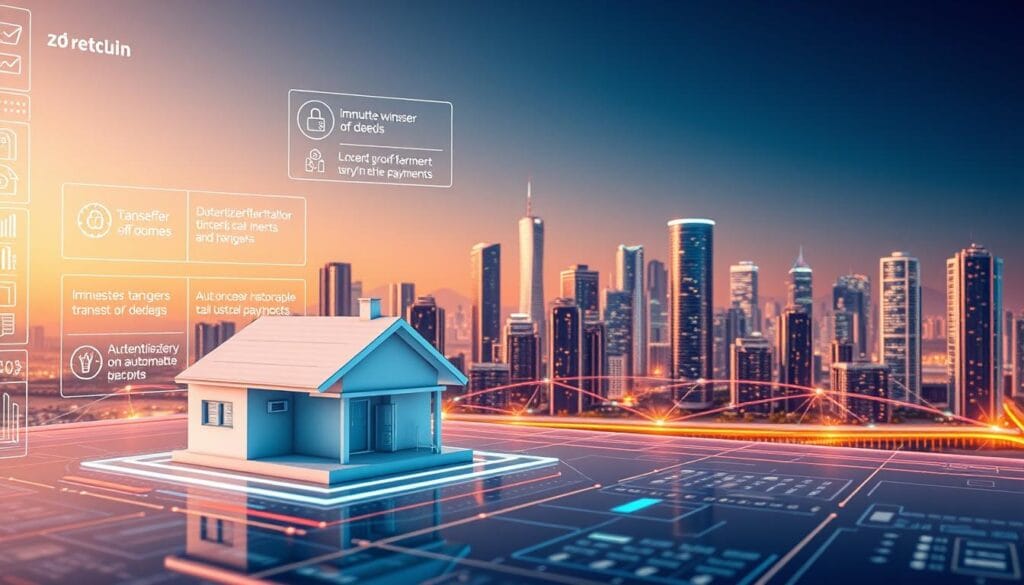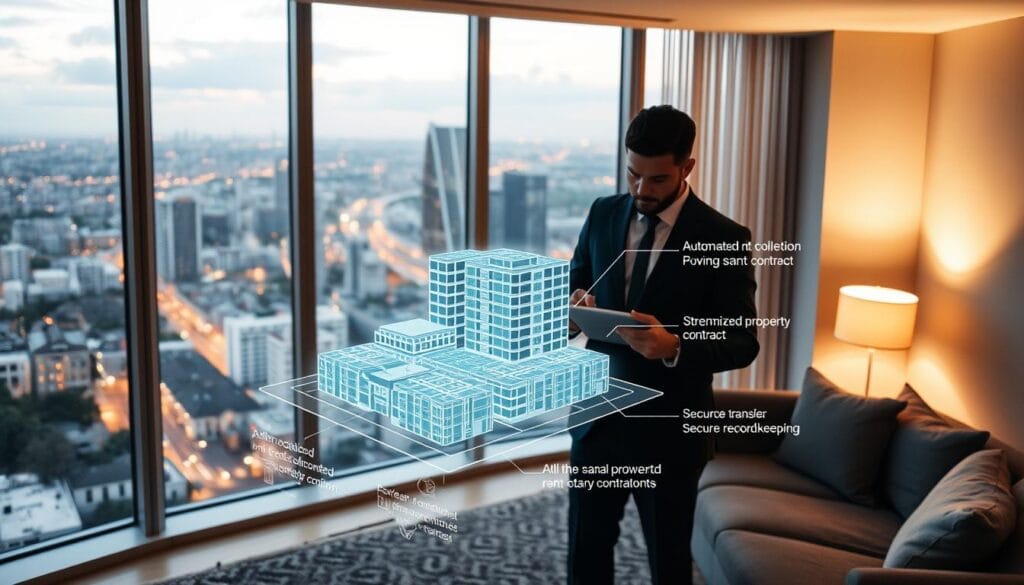The global real estate market grew from $7.4 trillion to $8.5 trillion in managed assets in just one year, according to an MSCI report. This rapid expansion highlights the need for innovation—enter blockchain. By leveraging decentralized ledgers, the industry is reducing friction in deals, enabling fractional ownership, and opening doors to global investors.
Ethereum’s smart contracts are at the forefront, automating agreements and cutting delays. Tokenization allows properties to be divided into tradable shares, democratizing access. Meanwhile, legacy systems are being modernized without displacing professionals—efficiency meets expertise.
For those new to the concept, this beginner’s guide breaks down the fundamentals. Traders can also explore strategies to capitalize on this shift.
Key Takeaways
- Blockchain reduces transactional friction in real estate.
- Tokenization enables fractional property ownership.
- Smart contracts automate and secure agreements.
- Global investors gain easier access to markets.
- Legacy systems integrate with new tech seamlessly.
Introduction to Blockchain in Real Estate Transactions

Tokenized assets are unlocking liquidity in historically illiquid markets. This shift stems from decentralized ledgers that record ownership securely and transparently. Unlike traditional systems, these digital frameworks reduce reliance on intermediaries while speeding up deals.
What Is Blockchain and How Does It Apply to Real Estate?
At its core, blockchain technology is an immutable ledger that tracks transactions across a network. In property deals, it converts physical assets into programmable digital securities. For example, Ethereum enables fractional ownership by dividing properties into tradable tokens.
This approach solves two major hurdles: illiquidity and high barriers to entry. Investors can buy shares in premium properties instead of funding entire purchases. Sweden’s Lantmäteriet land registry, partnering with banks, already uses this model to streamline titles.
Why the Industry Needs Disruption
The real estate industry struggles with siloed data and slow processes. Developers face loan rates as high as 29%, while closings take 30–60 days. Blockchain’s near-instant settlements and shared ledgers cut these inefficiencies.
“By 2027, smart contracts could reduce intermediary roles by 40% in property deals,” predicts a Deloitte report.
For investors, this means lower costs and global access. Learn how to leverage these changes with expert picks for digital securities.
Key Benefits of Blockchain in Real Estate Transactions

Decentralized technology is reshaping property deals by solving long-standing inefficiencies. From fraud prevention to micro-investments, these innovations address core industry challenges while expanding opportunities.
Enhanced Transparency and Reduced Fraud
Immutable ledgers create tamper-proof records of ownership, eliminating title disputes. Every transaction is cryptographically verified, reducing fraud risks by 90% in pilot programs. This transparency builds trust among buyers, sellers, and investors.
Lower Transaction Costs and Faster Processing
Traditional broker fees average 6%, while decentralized peer-to-peer models cut costs to 1–2%. Automated title searches via shared ledgers reduce expenses by 40%. Faster settlements—often within hours—replace weeks of paperwork.
Similar efficiencies are seen in parametric insurance, where automation streamlines claims.
Fractional Ownership and Global Investor Access
Platforms like ATLANT tokenize properties into tradable shares, lowering minimum investments from $50,000 to $500. This democratizes access to premium assets, attracting investors worldwide. NFTs represent fractional ownership, enabling micro-portfolios.
Automated Processes Through Smart Contracts
Smart contracts execute lease agreements and rent collection without intermediaries. Ethereum-based systems auto-distribute dividends, ensuring compliance. One Dubai project reduced administrative costs by 75% through such automation.
“Tokenization could unlock $1.4 trillion in illiquid real estate assets by 2030,” forecasts JLL Research.
Real-World Use Cases of Blockchain in Real Estate
Digital ledgers now power seamless asset management across borders. From fractional investments to automated leases, decentralized solutions tackle industry pain points with precision.
Tokenization of Properties for Easier Trading
Platforms like Propy convert physical properties into tradable digital tokens. A 2023 study showed REITs using this model saw 300% liquidity jumps. Investors buy shares as small as $500, democratizing access to high-value assets.
Casper’s upgradable smart contracts enable dynamic REIT management, adjusting portfolios in real time. Vermont and Arizona legally recognize these contracts as binding records.
Streamlined Property Management and Leasing
IoT-connected smart contracts automate maintenance requests and rent payments. Dubai’s pilot reduced overhead by 75%. Tenants benefit from transparent workflows, while landlords gain efficiency.
Explore how AI-powered apps complement these systems for financial tracking.
Decentralized Land Registries and Title Management
Sweden’s blockchain-based system processes titles in hours, not weeks. Contrast this with Honduras’ paper records, where hurricanes caused irreversible ownership disputes.
“Dubai mandates full blockchain integration for land registries by 2026,” confirms its Land Department.
Such frameworks eliminate fraud risks while accelerating transactions. For deeper insights, review ConsenSys’ analysis of global adoption.
Challenges and Considerations for Adoption
Adopting decentralized solutions in property deals faces significant roadblocks despite their transformative potential. Regulatory ambiguities and technical limitations create friction, slowing the *industry*’s transition to digital ledgers.
Regulatory Hurdles and Legal Frameworks
The SEC scrutinizes security token offerings (STOs), treating them as securities. This creates compliance burdens for fractional ownership platforms. State-level smart contract laws also conflict—Wyoming recognizes them, while California lacks clear guidelines.
GDPR’s “right to be forgotten” clashes with immutable ledgers. Property records requiring edits pose *security* risks, deterring EU investors. Meanwhile, title insurers resist automation, fearing reduced roles in fraud prevention.
Integration with Existing Real Estate Systems
Legacy MLS platforms struggle with *integration* into blockchain protocols. ShelterZoom’s API-first approach bridges this gap, syncing data without overhauling infrastructure. *Banks* like JPMorgan test R3 Corda’s framework for interoperable land registries.
The *industry* must address these challenges to unlock the *future* of transactions. For insights on balancing innovation with risk, explore AI-driven risk assessment tools.
“Standardized global frameworks are the *need* of the hour to accelerate adoption,” notes a 2023 MIT Real Estate Tech report.
Conclusion
The future of property deals is digital. PwC predicts 25% market penetration for decentralized solutions by 2028, signaling a shift toward transparent, efficient systems. This technology democratizes access, letting investors participate with smaller capital.
Professionals must prioritize blockchain literacy to stay competitive. Emerging tools like Casper’s smart contracts simplify implementation while reducing costs. Integration with AI further enhances predictive analytics for maintenance and valuations.
The real estate market faces a clear need for modernization. Early adopters gain strategic advantages as legacy systems evolve. For actionable insights, explore robo-advisory platforms that complement these innovations.

